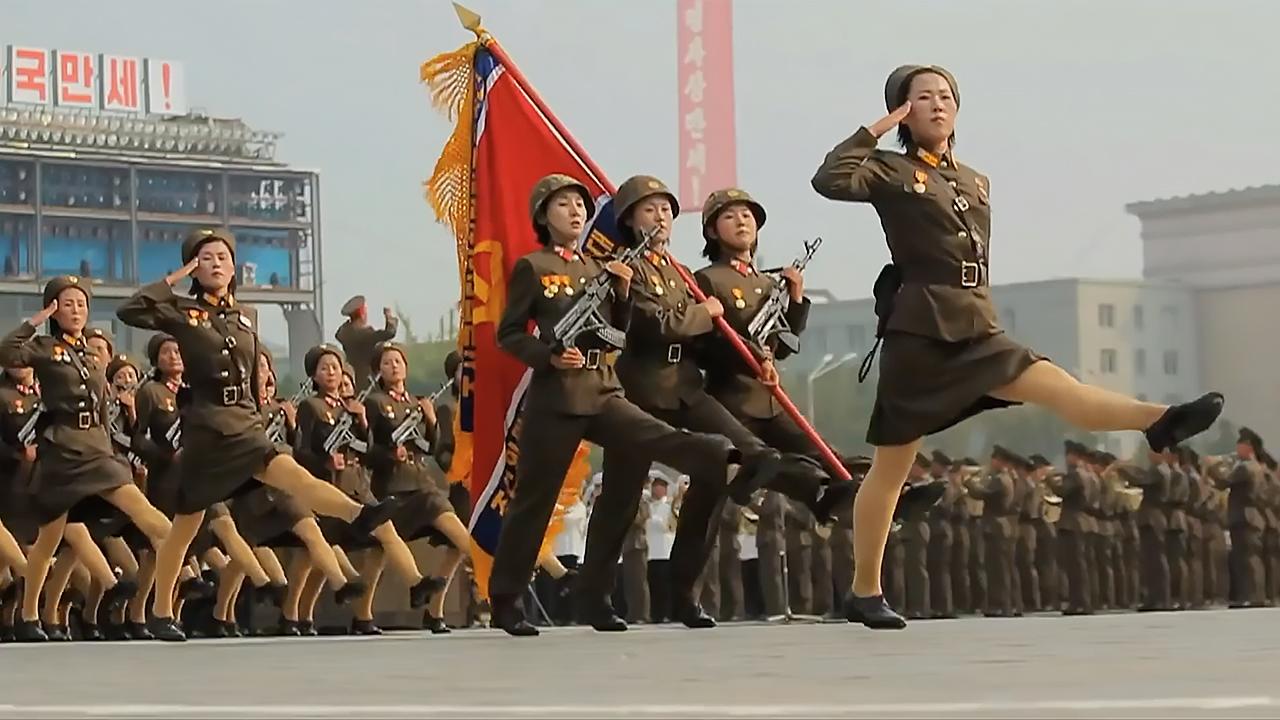You see him everywhere, a large sneering bully of a man. He’s the Donald, the #potus—really, is that so much quicker to say than President?—the orange skinned asshole with the trophy wife surrounded by bilious acolytes, who is dominating the world’s media while declaring most of it fake. Those of us who remember better times, or at least promises that such days might arrive, react in despair and grim contemplation as we wonder how it all went so wrong.
This year, Hot Docs will premiere three Canadian films that examine some of the root causes of the Age of Trump: John Walker’s Assholes, Fred Peabody’s The Corporate Coup d’État and Larry Weinstein’s Propaganda. None directly confronts Trump. Walker, Peabody and Weinstein see him as part of the problem: the purported populist supposedly helping the working class that feels betrayed by liberal promises while actually being the increasingly harsh representative of the upper class, which has to be pleased that one of their own has been elected to what everyone still refers to as the highest office in the land.
The Boomer Generation isn’t dead, though many wish it would go away. Here’s an odd fact: Donald Trump, Bill Clinton and George W. Bush were all born in 1946, the first year of the boom. Here’s another: none of them served in Vietnam but each increased military spending in the U.S. by hundreds of millions. Who is better to critique them than documentary filmmakers who are younger members of their cohort? Weinstein, Walker and Peabody independently realized that it was the essay form, which could plunge beneath the surface and allow them to go for broke, looking at what caused the situation we’re in and how we might move forward. With MSNBC and the Intercept, in very different ways, taking on Trump directly, a space has been left open for documentarians to look at our society and question how we arrived at where we’re at, and suggest ways in which we can eradicate ourselves from our current situation.
Fred Peabody’s The Corporate d’État is only his second feature documentary — his first was All Governments Lie — but he’s an old pro, a former broadcast journalist who worked on CBC’s fifth estate for years and, previous to that, distinguished himself as an Emmy-winning investigative television journalist and producer in the United States, working most notably at ABC News 20/20. Working with White Pine Pictures and producer Peter Raymont, another Boomer with many award-winning documentary credits, Peabody has crafted a film that captures the most dispiriting aspect of the Trump era, that corporations have already taken over the vast majority of the world.
Peabody was inspired to make the film by the thinking and writing of three people: the Canadian philosopher John Ralston Saul, who coined the phrase “corporate coup d’état” in his 1995 Massey Lectures; Chris Hedges, the Camden, New Jersey writer whose Days of Destruction, Days of Revolt (with illustrations by Joe Sacco) is a tough, compassionate account of poverty in America; and the Intercept’s Jeremy Scahill, who told Amy Goodman, on her influential show Democracy Now!, “There already has been a coup in this country, but it’s been a silent coup.” Scahill was referring to the link between corporate interests, the obscenely high priced financing of political campaigns and the outlandish costs of funding the U.S. military. Says Peabody, “Somebody had to connect the dots and give an overview that explains why we have this bizarre dystopia in Washington D.C. and the White House.”
Speaking of the film’s structure, Peabody acknowledges “It’s a hybrid between an essay film and cinema verité, because we have verité style shooting in the Rust Belt and in Camden. I wanted to have a structure that was intellectually sound, that presented a thesis, but illustrate it with examples of scenes that we could capture in a verité style to show the ultimate victims.” The mélange approach works for the film, which moves from interviews with disgruntled citizens in the Rust Belt town of Youngstown, Ohio, which used to be home to major steel production, to Hedges’ Camden, where RCA Victor and Campbell Soup formerly had huge factories, to Washington, D.C., where lawmakers and corporate lobbyists refuse to talk to reporters, including Lee Fang, whose non-encounters have a Roger and Me feel to them.
Given his background, it makes sense that Peabody employed a group of journalists to carry the shifts in focus that inevitably occur when you’re investigating the corrupting power of corporations on democracy, the anger of a disenfranchised working class, and the wild antics of Donald Trump. He points out that his discomfort with making a pure essay film is based on his belief that “narration [essential in such docs] is just very old fashioned. Even the director narrating his film doesn’t make sense, unless it’s a highly personal film. Ideally, you don’t want to have narration. I consider the journalists, philosopher and writers as characters in the film.”
Besides Saul, Fang and Hedges, Peabody worked with economist and historian Gar Alperovitz, independent journalist Sarah Jaffe, philosopher Cornel West, Canadian author and advocate Maude Barlow and investigative reporter Phillip Martin. Particularly interesting are the scenes with the African-American Martin, who finds an easy rapport with many white citizens of Youngstown, who are more than happy to share with him their reasons for voting for Trump.
Martin and Peabody were aware that Rust Belt communities used to vote for Democrats and aren’t, to quote Scahill, “just racist hillbillies.” Says Peabody: “Nobody factored in the disgust that many long time Democrat voters—particularly working class in the Rust Belt and the Coal Belt—had for the establishment politicians of both political parties. Trump was running against both establishment parties. The other thing that surprised me in the Rust Belt was how many of these voters who flipped for Trump said to us, ‘If Bernie [Sanders] had been running, I might have voted for him.’ It’s very understandable. They wanted to throw a brick through the window of the establishment, so to speak, because they’d been screwed by the corporate Democrat and Republican politicians who would promise anything and then, as soon a
For Larry Weinstein, Propaganda: The Art of Selling Lies is a departure from his unique oeuvre, which has largely concentrated on bios of such composers as Ravel, Schoenberg and Shostakovich. His work has often been unique stylistically—Ravel’s Brain had passages that resembled an experimental film with extraordinary dream-like imagery replicating what the composer might have thought while enduring cranial surgery—but he has never before tackled politics or the essay form.
“I think Trump was my muse in this film,” says the director and co-scriptwriter. “I’d wake up every morning, read what he’d tweeted, and get infuriated. Fury fueled this film. I’d sit down and start writing some things and David Mortin and Andrew Edmonds would draw it out of me. They didn’t like it when I was in a good mood because I couldn’t write as well. They would enhance what I had written and help structure the film based on that.”
Speaking of the film’s content, which goes back to Neanderthal art—arguably the precursor to today’s graffiti—through the spiritually and politically persuasive Medieval church culture, replete with paintings and music, to the revolutionary Twenties and Sixties posters of Lenin, Mao and Che, to such contemporary artists as Ai Weiwei and Shepard Fairey, albeit not presented in that reductive chronology, Weinstein admits that his only recourse was to embrace the essay.
“Part of that essayness,” says Weinstein, “is the fact that there’s narration. I’m the narrator positing some ideas, and there’s some bookends and through-lines to that. The feeling I was going for was a series of non-sequiturs. I wanted the person watching the film to have this feeling of not knowing who we were going to meet next, where we were going next, or even what century we were going to be talking about next. I wanted this sense of disorientation because I felt that the meaning of the film was strong enough that it could undergo it. It’s ultimately always about the same theme of propaganda—even though there’s many variations on that theme. So you get Astra Taylor suddenly talking about gender politics, or a scene from Riefenstahl’s Triumph Of The Will, or Jim Fitzpatrick, a wonderful Irishman, talking about how he created the famous Che Lives poster. There’s certain things you would expect in a film like this, and there are those you would not expect.”
That sense of the unexpected is in keeping with Weinstein’s stylish approach to cinema. Trump is clearly motivating him to make this film but he can’t let go of his cultural values. “The idea is that the film is about art as well. In a way, the premise of the film is looking at propaganda through the prism of art. If it was just blatantly about propaganda, then you’d get into a drier realm where you might as well just have eighty percent Noam Chomsky, with some Naomi Klein too.” Weinstein’s historic account of propagandistic art shows that even many of the greats—from Beethoven to Shostakovich to Riefenstahl— will extol the virtues of the Pope or the Emperor or the Fuhrer if they’re pressed to do so. In Trump’s America, propaganda doesn’t have to work on that high a level. Fox News can do it and so can parts of the Twitterverse.
Of course, there are artists who have used art as a propagandistic tool against their rulers. It’s fascinating to hear what Weinstein says about the iconic revolutionary artist Ai Weiwei. “He grew up through the whole Cultural Revolution crap. His father was imprisoned. He literally grew up in labour camps because they weren’t conforming. So he’s very aware of the propaganda of the Cultural Revolution and the craft, the facelessness of their craft.
“Listen to the music of China since the Cultural Revolution. For the most part, it’s a nightmare, because it’s music by committee and it has no flavour whatsoever. Before, music was superb, intricate, nuanced, great music of a brilliant culture that had more innovation than any other. The thing that’s so interesting with Ai Weiwei is he talks about propaganda being the propaganda of the individual. I mean, he has an ego, a big ego, but it’s that ego that is fighting against oppression. That’s why the Chinese government hates him. He’s an individual. He’s fighting for individualism. Each individual is capable of fighting propaganda by creating their own propaganda.”
Of course what he says about Ai Weiwei is perceptive but what I love is that Weinstein is still angry about what happened to Chinese music because of the Cultural Revolution. He is someone who cares passionately about art.
Weinstein’s rage, which fueled Propaganda, is essentially about the loss of ethics in modern society. “I believe that the age of Trump comes from an absolute dumbing down of society and America and the world,” says Weinstein. “Reality television is supposed to be about truth but it’s not. It’s funny—if you go back to the National Film Board and cinema verité—we’re lacking verité in our lives. There is no truth. Everyone knows so-called reality television is fake, and we’ve got a reality television president. People are bored and they want to be thrilled. Trump is interesting. He’s edgy. You don’t know where he’s going. That’s exciting and fun. That’s why we watch the news obsessively.”
The originality of Propaganda is that it never gets away from Weinstein’s cultural roots. This may be the most beautiful denunciation of the Trump era yet. Working with his regular collaborators, cinematographer John M. Tran and editor David New, Weinstein has created an intense visual display of propagandistic art through the ages.
POV asked Weinstein about assholes in the context of Trump’s election. He was happy to reply: “Assholes always have a very strong position and we see what happens when Democrats run against them and they’re all reasonable—or even when reasonable Republicans do. The assholes come out on top as their very strong opinions end up appealing to a lot of people who are angry.”
John Walker may have now become the cinema expert on the subject thanks to his new film Assholes: A Theory. Just like Weinstein and Peabody, Walker is quite aware that the vast majority of corporations and many governments are run by assholes. But he’s also come to realize that we have to apply a stricter definition to a word that most of us say all too often.
How do you define an asshole? “It’s in their way of seeing the world: an entrenched sense of entitlement and an unwillingness to listen to complaints of others,” says Walker. “By defining the character, it becomes a very useful word. I’m a lot more careful now about how I would use this word to describe somebody.
It’s not a word to use if you don’t like somebody. The asshole is someone who doesn’t consider you an equal, so it brings up questions of equality and liberty and freedom of individuals. They see themselves as superior to you and it’s very disturbing. It makes us very angry when these types take special advantages that they feel they deserve and that you don’t.”
Walker, like Weinstein and Peabody’s producer Peter Raymont, is a veteran filmmaker. He and Weinstein have been subjects of Hot Docs retrospectives and one assumes that it’s only a matter of time before Raymont receives that career recognition. Along with Kevin McMahon, also a Hot Docs retrospective alum, Walker is an essayist, although not all of his films fit into that genre. Assholes does, of course, and it’s a pleasure to watch him manoeuvre through the various ways we can regard this increasingly disturbing phenomenon. Walker had been thinking about asshole behaviour after a female director remarked to him at a festival, “do you have to be an asshole to be a great director?” Soon after, he was at the University of Toronto bookshop and found Aaron James’ book, Assholes: A Theory. Within days, the director was on a plane to California to meet the moral philosopher who had written the book. The film is not a direct transfer of the book, Walker is quick to acknowledge—“I simplified it”—but he’s pleased to note that James approves of the essay film.
Asked to explain how he documented the natural born sociopath or egotist in its native environment, Walker replied: “I had to look at breeding grounds for asshole behavior. I identified four breeding grounds in an American context: Wall Street, Washington, Hollywood, and Silicon Valley. Washington, I felt, was taking care of itself in terms of exposing its assholery 24 hours a day on the news. Wall Street is a bit of a cliché of assholery in the financial sector. Hollywood also takes care of itself in revealing its own assholery. In terms of asshole capitalism, I found Silicon Valley more interesting than Wall Street, because of its strong liberal starting baseline: ‘we’re creating a better world.’”
One of Walker’s commentators in the film is the famous former Monty Python member John Cleese, who at one point says, “the greatest mistake was letting these nerds tell us how to live.” Although not all of the Silicon Valley “geniuses” are assholes, most are socially awkward with little sense of how the rest of the world lives. Their sense of aesthetics is neatly summed up in a sequence of drone shots created by Walker of the three headquarters for Facebook, Google and Apple. One looks exactly like the Pentagon. From above, they all resemble the sort of imposing fascist architecture that Albert Speer created for Hitler. The royalty of the Valley manifest a monumental sense of entitlement even in their buildings.
Says Walker, “They’ve reneged on their moral responsibility to deal with the negative impact of the products they’re producing. We’re just at the beginning and I can see it coming. There’s going to be pushback on Silicon Valley and we’re seeing it when Washington is calling up CEOs of these companies to testify. I say in the film that Americans have always been for the free flow of information. That’s been their mantra: ‘don’t restrict our movies in your countries. Let the free flow of ideas happen.’
“It was working for them when it was a one-way street, but—and I said this to [the Economist’s former editor-in-chief ] Bill Emmott— when there was this Russian interference, that was a game changer. It’s the first time in history that’s happened. So Washington is now concerned that the free flow is not one-way but two-way, and they’re vulnerable to complete manipulation of their population. That’s a big issue. Therefore you’ve got Facebook just nodding and saying ‘sorry’ but not doing anything about it.”
More egregious—or at least more painfully obvious—is how Wall Street handled the 2008 economic crisis. Walker plays this up in the film: “the crisis was partly due to Clinton’s deregulation of checks and balances, which is when assholery took over the system. It’s a great example of what happens when you allow assholes to take over and run the system. It ends up in disaster.
“They’re firing half the staff, companies like Goldman-Sachs lost billions of dollars that belonged to their clients, they’ve bankrupted the economy and caused a global crisis, then they’re sitting in front of committees justifying their bonuses: ‘We still deserve the bonus. We were just smarter than everybody else. We were making lots of money.’ That’s a classic example of assholery. Thinking they’re smarter than everybody else and that they deserve the rewards, with total disregard for any impact of their actions. So we looked at that classic example in the film.”
Walker includes in the film a Canadian example of toxic assholery, the nearly tragic case of Sherry Lee Benson-Podolchuk, a member of the RCMP, who got into trouble with her fellow officers after she refused to play ball and lie for a fellow officer who had been drunk on the job. “She’s a superhero to me,” Walker tells POV. “She was the first woman to go public about sexual harassment and bullying within the RCMP. And no one was listening to her, including the media. The government wasn’t listening. Her superior officers and even her colleagues weren’t listening to her. But she kept pressing and pressing and pressing over a 20 year period. She didn’t let up.
“She’s lucky she didn’t commit suicide and she is the example of pushback. But what’s important in the sequence, because I am advocating pushback against assholery in the film, is that it’s not necessarily an easy thing to do. She was a single parent in a small town. She needed a job and couldn’t just quit. Where was she going to go: McDonald’s or Tim Horton’s? She maintained her dignity, and it led to two class action suits against the RCMP. Finally, the government appointed a female head of the force. So positive change in the big macro sense took place, and she was the forerunner to the #MeToo movement.”
Assholes needed to take on a politician and interestingly, Walker chose Italy’s Silvio Berlusconi instead of Trump. Berlusconi isn’t just a politician; his pernicious presence has affected the media and Italian society’s perception of women as well. Says Walker, who spent a considerable amount of time in Italy, talking to experts: “Live television in Italy before Berlusconi got involved was the equivalent of BBC. It was one of the best public networks in the world and Berlusconi destroyed that because they had to start competing with him [and his sexist variety, talk and game shows featuring scantily dressed women]. People were watching his misogynistic and dumbed down programming and they had to compete, which is a slippery slope.”
How do you fight assholery, nefarious corporations, entitled social media billionaires and scandalous politicians like Trump? Peabody, Weinstein and Walker all offer variations on the same reply: be more diligent, fight against injustices, work to get rid of assholes. To which POV can add: watch these documentaries and others like them. They may not provide solutions but at least you’ll understand more about how we arrived in this very difficult era.












